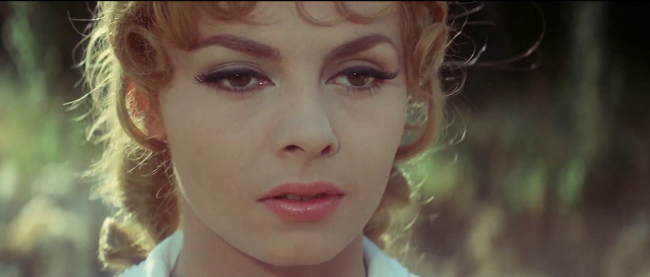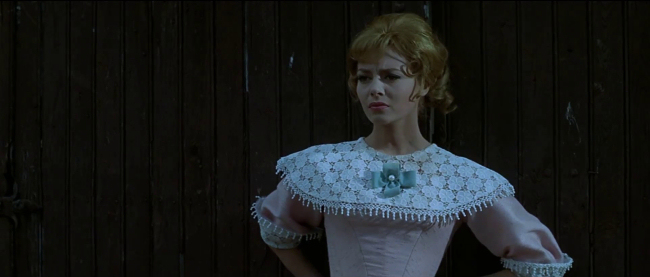
In the world of sixties and seventies pulp fiction, the despoiling of female sexual purity was endlessly exploited for suspense and titillation. This rape fantasy is the only thing held in common by the four movies that 1964's Angelique, Marquise des Anges (Angelique, the Marquise of Angels) works out to be. Beginning as youthful adventure film, it swiftly moves to Beauty and the Beast pastiche, then historical drama, and finally to Reformation courtroom drama. Through it all, the beautiful and pure hearted Angelique is molested or threatened with molestation by a variety of men. Like the best pulp stories, it's compulsively watchable, its fast pace movement from unformulaic plot point to plot point sort of thrilling.

Once again, we have a protagonist only very, very loosely based on an actual seventeenth century French woman, the Marquise du Plessis-Belliere. We meet the teenage Angelique (Michele Mercier) playing in the river with her hunky first love, Nicolas (Giuliano Gemma). She not realising her nipples are showing when he playfully splashes her with water, and being dumbfounded when he suddenly seems entranced, being the first of many occasions where her sexual allure without any lust on her part excites the lust of a man.
The scene is interrupted when the sounds of gunfire and screaming alerts them to the fact that a nearby fort is being razed to the ground.

Nicola wants immediately to pursue the bandits and take revenge but Angelique persuades him to split up and warn everyone they see in the countryside. The meet up at the castle where Angelique's family is waiting. All this happens in just the first few minutes of the film. We're introduced to a variety of supporting characters, too, lightning fast, but it's all held together by Angelique who's infused with real, earnest charm by Mercier.

One of my favourite scenes follows. After some boys take turns holding Angelique and forcing her to kiss them, she runs and hides in a room where she overhears a nobleman's plot to murder the king with a poison he places in a strong box. After he leaves, Angelique, with the same expression of mischief on her face as when she played hide and seek with the boys, takes the strongbox and hides it and continues with her day. Foiling a plot to murder the king is all part of the day's routine childish contests. She brags about it later to her friends and family. All of this only brings us to twelve minutes into the film.

Because she insults the would-be regicide, her parents send her to a convent and when she comes out a few years later she's forced to marry the Baron Jeoffrey de Peyrac (Robert Hossein). Why exactly isn't quite clear but it doesn't seem implausible. Here the movie indulges in some unabashed hypocrisy as we learn that the horribly scarred Jeoffrey, who nevertheless has his pick of dozens of adoring, beautiful young women, chooses Angelique for his bride sight unseen because of her legendary beauty. She's disgusted by his scarred features but Jeoffrey hopes she'll eventually see his inner beauty despite the fact it can hardly be said he married her for hers. He massages her breast a while before telling her that he won't make any advances without her permission.

He has a house full of black slaves he bought in America. Since at this time the transatlantic slave trade was still in its earliest stages it's not clear why he didn't buy the slaves in Portugal where slaves where generally brought from Africa--at this point, Portugal still essentially owned West Africa, according to the pope. But the film is filled with plenty of anachronisms like the tricorne hats everyone starts wearing around seventeen years before they were invented and long before they become popular in France. And of course, since Jeoffrey is the film's hero, the slaves all adore him and serve him quite willingly, especially the one who rescued Jeoffrey from a Muslim corsair, which his how Jeoffrey got the scar. Now that Muslim pirate captain is also Jeoffrey's willing slave for some reason among a group of multinational slaves who run his mine and outdoor alchemy lab where he turns ash into gold.

Another of my favourite scenes, probably because it's one of the few moments where Angelique is allowed some libido, but also because it's so damned weird, soon follows where Angelique becomes sexually aroused watching Jeoffrey fondle a statue his men have excavated.

I feel like it could take days to tell you all the stuff that's in this film--and it's the first of a series of films, all starring Mercier as Angelique. Among the scenes I liked that follow--a really great sword fight between Jeoffrey and a man who insults Angelique; a chase scene in the Louvre that begins with Angelique reluctantly trying to seduce Louis XIV and ends up with her being chased by men who either want to rape her or poison her or both; and the ending which bizarrely seems to turn the movie into a Les Miserables pastiche at the last minute. She also has two kids somehow along the way. This movie is downright dizzying.

No comments:
Post a Comment